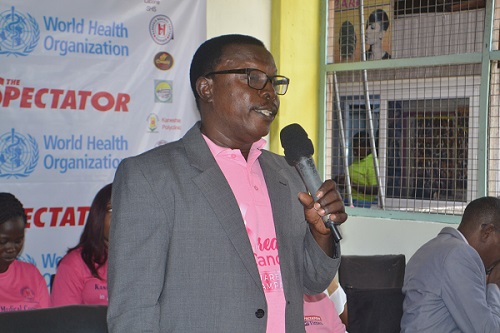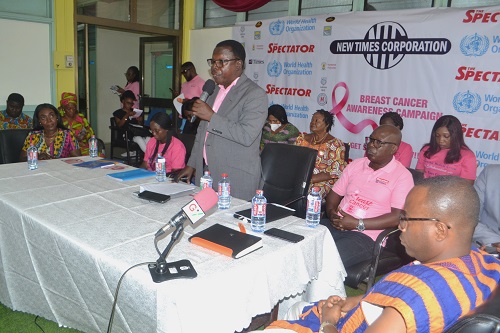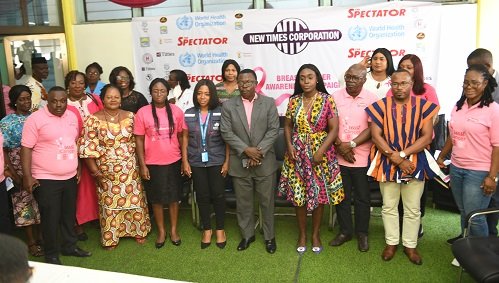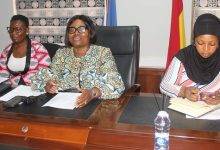
The Managing Director of the New Times Corporation (NTC), Mr. Martin Adu-Owusu has advised the public to be tenacious and relentless in the fight against breast cancer disease.
“It is our collective and decisive resolve to fight breast cancer in all its tendencies that would have positive impact on both present and future generation,” he said.

He said this when The Spectator, The corporation’s weekly newspaper, organised the maiden Breast Cancer Campaign at the Kaneshie Market Complexyesterday in Accra, to create awareness and also screen market women for the disease.
The two-day Campaign is on the theme “Life before and after Breast Cancer: A future of Positivity and Hope” and it is the NTC’s contribution to raise awareness of the disease.
Mr Adu-Owusu made reference to the World Health Organisation (WHO), 2020 report which said, there were 2.3 million women diagnosed with breast cancer and 685,000 deaths globally, “At the end of 2020, there were 7.8 million women who were diagnosed with breast cancer in the past 5 years making it the world’s most prevalent cancer.”

He described the situation as worrying, adding that NTC’s campaign was one of the strategies to help reduce the incidence of breast cancer in the country.
He, therefore,called on individuals, and organisations to be ambassadors of breast cancer to fight the menace.
“Breast cancer is preventable and curable when we do regular self-examination and screening. This is not a difficult task and we can save many lives and bring solace, hope and prosperity to many families if we continue with our aggressive campaign on regular self-examination and breast screening,” he said.
The Editor of The Spectator, Mr Emmanuel Amponsah said the campaign would educate the public on early symptoms and signs of Breast Cancer; preventive measures, diagnostic and treatment centres, the measures put in place for early detection and to assist in the management of patients of Breast Cancer, among others.
He referred to the Globocan statistics carried by the Global Cancer Observatory website in March 2021, which said 4,482 women in Ghana were diagnosed with breast cancer in 2020, “In the same year, it said 2,055 deaths were recorded. In fact, it is estimated that 4,650 women are diagnosed with breast cancer annually in Ghana while more than 2,000 women die of the disease yearly.”
Mr Amponsah said the campaign would be taken to the door-steps of the Labone Senior High School to educate the students on Breast Cancer in order to prepare them in the fight against the diseases.
The Member of Parliament for Okaikoi South, Ms Dakoa Newman, urged the market women to desist from storing their mobile phones and other items in their brassieres, adding that this act could expose the breast to radiations emitting from the mobile device
She encouraged women to seek early health check-ups and avoid self-treatment at homes, especially using unprescribed medicines
In a speech read on behalf WHO Representative Dr Francis Kasolo said 2.3 million women in 2020, were diagnosed with breast cancer and 685,000 deaths globally.
“As of the end of 2020, there were 7.8 million women alive who were diagnosed with breast cancer in the past five years, making it the world’s most prevalent cancer,” he said.
According to him, there were more lost disability-adjusted life years (DALYs) by women to breast cancer globally than any other type of cancer.
Dr Kasolo said approximately half of breast cancer develop in women who have no identifiable breast cancer risk factors other than gender and age over 40 years
He said certain factors that increase risk of breast cancer are obesity, harmful use of alcohol, family history of breast cancer, History of radiation exposure, reproductive history (such as age that menstrual periods began and age at first pregnancy), tobacco use and postmenopausal hormone therapy.
Dr Kasolo said strategies for improving breast cancer outcomes depended on fundamental health system strengthening to deliver the treatments that are already known to work.
He expressed the hope that every woman in Ghana diagnosed with breast cancer would have access to specialised care without causing financial catastrophe in line with Universal Health Coverage.
BY AGNES OPOKU SARPONG




![Dr Faustina Frempong-Ainguah deputy government Statistician [second from right] with the staff of ATU and others photo Lizzy Okai](https://www.ghanaiantimes.com.gh/wp-content/uploads/2024/04/WESTERN-NORTHERN-Dr-Faustina-Frempong-Ainguah-deputy-government-Statistician-second-from-right-with-the-staff-of-ATU-and-others-photo-Lizzy-Okai-220x150.jpg)


